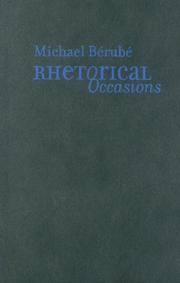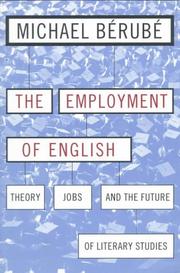| Listing 1 - 3 of 3 |
Sort by
|

ISBN: 0807877387 9780807877388 0807830674 9780807830673 0807857777 9780807857779 9798890881458 Year: 2006 Publisher: Chapel Hill : University of North Carolina Press,
Abstract | Keywords | Export | Availability | Bookmark
 Loading...
Loading...Choose an application
- Reference Manager
- EndNote
- RefWorks (Direct export to RefWorks)
Collects twenty-four of the author's major essays and reviews, as well as a sampling of entries on literary theory and contemporary culture from his award-winning weblog. This work offers an array of interventions into matters - academic and nonacademic.
Humanities --- Learning and scholarship --- Popular culture --- Criticism --- September 11 Terrorist Attacks, 2001 --- New Left --- Rhetoric --- Blogs --- Blogging --- Web logs --- Weblogs --- Diaries --- Social media --- Web sites --- Citizen journalism --- Language and languages --- Speaking --- Authorship --- Expression --- Literary style --- Classical education --- Influence. --- Sokal, Alan D., --- United States --- Study and teaching.

ISBN: 0585337772 081472342X 0814713009 0814713017 9780814723425 9780585337777 9780814713006 9780814713013 Year: 1997 Publisher: New York, NY : New York University Press,
Abstract | Keywords | Export | Availability | Bookmark
 Loading...
Loading...Choose an application
- Reference Manager
- EndNote
- RefWorks (Direct export to RefWorks)
What sorts of cultural criticism are teachers and scholars to produce, and how can that criticism be "employed" in the culture at large? In recent years, debates about the role and direction of English departments have mushroomed into a broader controversy over the public legitimacy of literary criticism. At first glance this might seem odd: few taxpayers and legislators care whether the nation's English professors are doing justice to the project of identifying the beautiful and the sublime. But in the context of the legitimation crisis in American higher education, the image of English departments has in fact played a major role in determining public attitudes toward colleges and college faculty. Similarly, the changing economic conditions of universities have prompted many English professors to rethink their relations to their "clients," asking how literary study can serve the American public. What sorts of cultural criticism are teachers and scholars to produce, and how can that criticism be "employed" in the culture at large? In The Employment of English, Michael Bérubé, one of our most eloquent and gifted critics, examines the cultural legitimacy of literary study. In witty, engaging prose, Bérubé asserts that we must situate these questions in a context in which nearly half of all college professors are part-time labor and in which English departments are torn between their traditional mission of defining movements of literary history and protocols of textual interpretation, and their newer tasks of interrogating wider systems of signification under rubrics like "gender," "hegemony," "rhetoric," "textuality" (including film and video), and "culture." Are these new roles a betrayal of the field's founding principles, in effect a short-sighted sell-out of the discipline? Do they represent little more that an attempt to shore up the status of--and student enrollments in--English? Or are they legitimate objects of literary study, in need of public support? Simultaneously investigating the economic and the intellectual ramifications of current debates, The Employment of English provides the clearest and most condensed account of this controversy to date.
English philology --- English literature --- English language --- English teachers --- Interdisciplinary approach in education. --- Language and culture --- Study and teaching --- Political aspects --- History and criticism --- Theory, etc. --- Employment --- Vocational guidance. --- Integrated curriculum --- Interdisciplinarity in education --- Interdisciplinary studies --- Germanic philology --- Curriculum planning --- Holistic education --- Language teachers --- Lerarenopleiding --- (vak)didactiek talen. --- English language -- Political aspects -- United States. --- English literature -- History and criticism -- Theory, etc. --- English philology -- Study and teaching -- Political aspects -- United States. --- English philology -- Vocational guidance. --- English teachers -- Employment -- United States. --- Language and culture -- United States. --- Literature teachers --- Germanic languages --- Culture
Book
ISBN: 1137506105 Year: 2015 Publisher: London : Palgrave Macmillan UK : Imprint: Palgrave Macmillan,
Abstract | Keywords | Export | Availability | Bookmark
 Loading...
Loading...Choose an application
- Reference Manager
- EndNote
- RefWorks (Direct export to RefWorks)
This book is a lively, passionate defence of contemporary work in the humanities, and, beyond that, of the university system that makes such work possible. The book's stark accounts of academic labour, and its proposals for reform of the tenure system, are novel, controversial, timely, and very necessary.
Education, Higher. --- Literature. --- Social history. --- Philosophy. --- Public policy. --- Culture—Study and teaching. --- Higher Education. --- Literature, general. --- Social History. --- Philosophy, general. --- Public Policy. --- Cultural and Media Studies, general.
| Listing 1 - 3 of 3 |
Sort by
|

 Search
Search Feedback
Feedback About UniCat
About UniCat  Help
Help News
News